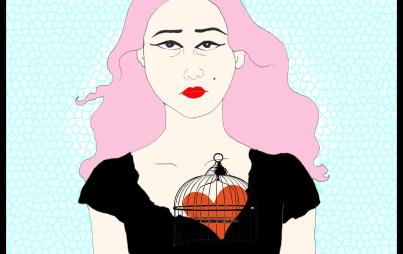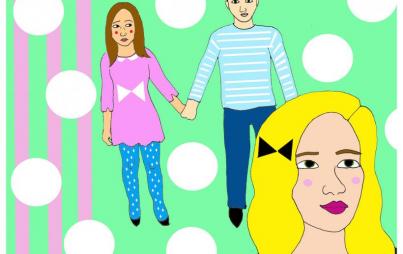
Abuse survivors should not have to charm their way to empathy.
Dating While (Semi) Damaged is a column about returning to the dating world after an abusive relationship, offering insight and occasional advice.
I am going to take a brief break from the main subject of this column to discuss something that’s been bothering me. I’ve known for awhile a handful of people do not believe my abuse story. In some ways, this is inconsequential. These people were never particularly important to me, but I cannot let it go. It illustrates a larger problem regarding how our society sees abuse and abusers.
When Randall and I were together, these people did not know us well — but knew us just enough to form some opinion.
I do not fit into the doe-eyed damsel-in-distress mold. I don’t demand effortless sympathy, and so I am often not believed.
Randall quickly comes off as likable, the Platonic ideal of a nice guy. This was why I stayed so long. I believed his excuses because Randall couldn’t possibly be abusive, right? He was a great guy, and everyone knew this. In fact, when I texted a friend for help one night when Randall was cursing me out, he was quick to remind me that no one would believe me because everyone knew he was a great guy. Randall was savvy enough to leave a trail of breadcrumbs in his wake that made him look like a sweetheart.
The brief impressions I left were not so stellar.
During those years, I was — to put it bluntly — kind of an asshole. I never did anything unforgivable and kept all my close friends despite some regrettable behavior, but I was unhappy and took that out on others. I was admittedly extremely difficult between the ages of 22 and 25. This was temporary. I believe Marni Michaels from Girls spoke the truth when she said everyone is an asshole when they’re 22. I changed, but accept some people have a good reason to have a low opinion of me.
A low opinion of my character should not translate to assuming I would lie about abuse, or that I somehow deserved abuse. Nevertheless, this seems to be the consensus with some. A friend of mine was once discussing an abuse trial with me. The victim lost because, on the witness stand, she came off as cold due to the trauma accrued.
“I wish society could catch up with the fact abusers are actually very charming,” she said, “And an imperfect victim isn’t necessarily a liar.”
I am an imperfect victim.
I do not fit into the doe-eyed damsel-in-distress mold. I don’t demand effortless sympathy, and so I am often not believed. Look at Paris Hilton. She is the beneficiary of an imbalanced distribution of wealth, so I understand why many find her unappealing. This collective distaste, however, does not mean she deserved to be the victim of a sex crime. In case you forgot, she was.
Paris Hilton had a sex tape released against her will. This is still considered fair game for comedic fodder. Tina Fey, perhaps the comedian most often lauded as a feminist icon, chastised Hilton on the Howard Stern Show for refusing to participate in an SNL sketch about the sex tape. Hilton has said in interviews she was largely incapacitated while the tape was being filmed and did not consent to its release. It’s understandable she would not want to participate in that sketch. She was not spoiled. She was traumatized.
Compare this response to the outrage over the 2014 celebrity nude photo leak, which included photos of stars like Jennifer Lawrence. The incident was atrocious, and we were right to condemn it. I am not suggesting otherwise. I am only highlighting the disparity between this reaction and the reaction to the Hilton sex tape. Celebrities like Lawrence are perceived as down-to-earth, candid, and likable. Lawrence’s public image is the polar opposite of Hilton’s. She readily gained the sympathy Hilton was denied. Of course, some people defended the hacker. I do not want to negate that. No matter who they are, women are unfairly chastised for their sexuality. I am only speaking of the overall response, which seemed to grant Lawrence considerably more sympathy than Hilton. Hilton too is an imperfect victim.
A victim’s unsavory qualities should have no credence when discussing their abuse.
Abuse survivors should not have to charm their way to empathy. Gaining compassion as a victim should not hinge on a popularity contest. I feel I lost a popularity contest with Randall. He could delight people with surface-level gestures that appeared good-natured. He always said “Hi” to people in the hallway, sent encouraging messages on Facebook with GIFs attached when people had bad days, and was amiable in social situations. When we were alone, he was a different person.
If you are a survivor, know this — I believe you.
This Dr. Jekyll/Mr. Hyde act is unsurprising. An abuser’s ability to conceal their true colors is not some fringe conspiracy theory. It’s a well-documented fact. I know some of Randall’s defenders are aware of this. They post articles on social media lamenting Casey Affleck’s Oscar win, condemning Woody Allen, insisting on the necessity to believe and empower victims. To know and to understand, however, are different animals.
While people may be aware the cycle exists, when it happens to someone they know — an acquaintance, a colleague, a classmate — they would rather cast the victim as a liar than reassess their conception of the abuser.
That original impression, the sweet-hearted role abusers play so well, is hard to shake. Many people who knew Randall, no matter how socially aware they are, chose not to shake it.
I think now of Joan Didion’s Slouching Towards Bethlehem, when she reflects on how it’s possible for people to be the unconscious instruments of values they would reject on a conscious level.
I am still waiting for society to catch up. I do not want to sound pessimistic, and I certainly do not want others in my position to despair, but I am not sure what to do to change things. I have told my story. Some people have chosen to believe me. Many people have not. I am done trying to reach out to nonbelievers because, frankly, it’s not my job. Even if it were, I doubt my words could ever shake the abundant influences that pre-program people to believe charismatic abusers over victims who lack that magnetism.
All I know is that I am not going to be silenced.
I am going to keep sharing my story. I hope that, while my words will likely not inspire great change, I can at least provide catharsis for fellow survivors.
If you are a survivor, know this — I believe you.








